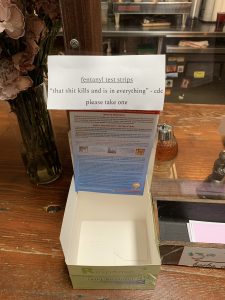 A mother wrote to me: It’s May 21st at 10:24 pm and about an hour ago I got a call that my daughter walked out of the rehab. Just today, I was telling my coworkers that I had such a good feeling about this rehab – a full one-year, Christian-based program. No outside contact, only immediate family. Twice I talked with her on the phone, and she loved it there. She didn’t even make it one full week.
A mother wrote to me: It’s May 21st at 10:24 pm and about an hour ago I got a call that my daughter walked out of the rehab. Just today, I was telling my coworkers that I had such a good feeling about this rehab – a full one-year, Christian-based program. No outside contact, only immediate family. Twice I talked with her on the phone, and she loved it there. She didn’t even make it one full week.
My reflection: I lost count of how many times this happened with my son. He entered a rehab center and, after a week or two, he walked out. Hope smashed. We parents feel betrayed, and our dreams feel suffocated.
Today’s Promise to consider: Dr. MacAfee told me that that relapse is not always failure, “It can be a great stepping-stone that directs the individual toward her own understanding of loss of control of her use, and how much work yet needs to be fostered.” When our children accept help and enter rehab, we celebrate with trepidation, hoping this is the time long-term recovery will stick. Today, I will pray that if my child relapses she remains safe and is able to learn more about her illness. I will acknowledge the powerful hold that the drug has on her. I will stay close.



 A mom wrote to me: My son is two years sober, has his own place, has been at his same job for almost two years, and is managing his own money. His best friend, with whom he spends lots of time, just had surgery and has been given pain pills. Unfortunately this brings me to an old, scared place. I wonder if the pain pills tempt him? Do I ask him or just calm my inner self and thoughts? I never really know if talking or even asking would make him upset or be helpful? Am I allowed to ask about the elephant in the room or will that not be healthy for him? The fear is always there, isn’t it Libby?
A mom wrote to me: My son is two years sober, has his own place, has been at his same job for almost two years, and is managing his own money. His best friend, with whom he spends lots of time, just had surgery and has been given pain pills. Unfortunately this brings me to an old, scared place. I wonder if the pain pills tempt him? Do I ask him or just calm my inner self and thoughts? I never really know if talking or even asking would make him upset or be helpful? Am I allowed to ask about the elephant in the room or will that not be healthy for him? The fear is always there, isn’t it Libby? A young man wrote to me: As a recovering addict, I know well that relapse happens. It took me many attempts to find sobriety. Each addict is unique in his or her own way, but for me I spent more than a decade avoiding the true problem – myself. Drugs filled the void inside me, an empty space of insecurity and anxiety (and sure a rebellious side when I was young). The road to recovery is a long one and the answer lies within the addict.
A young man wrote to me: As a recovering addict, I know well that relapse happens. It took me many attempts to find sobriety. Each addict is unique in his or her own way, but for me I spent more than a decade avoiding the true problem – myself. Drugs filled the void inside me, an empty space of insecurity and anxiety (and sure a rebellious side when I was young). The road to recovery is a long one and the answer lies within the addict. Tara Brach writes: The emotion of fear often works overtime. Even when there is no immediate threat, our body may remain tight and on guard, our mind narrowed to focus on what might go wrong. When this happens, fear is no longer functioning to secure our survival. We are caught in the trance of fear and our moment-to-moment experience becomes bound in reactivity. We spend our time and energy defending our life rather than living it.
Tara Brach writes: The emotion of fear often works overtime. Even when there is no immediate threat, our body may remain tight and on guard, our mind narrowed to focus on what might go wrong. When this happens, fear is no longer functioning to secure our survival. We are caught in the trance of fear and our moment-to-moment experience becomes bound in reactivity. We spend our time and energy defending our life rather than living it. A mom wrote to me: I remember my son saying two things to me about relapse:
A mom wrote to me: I remember my son saying two things to me about relapse: A mother wrote to me: My son is still on the revolving road to recovery. He has been in detox three times, rehab (both inpatient and outpatient), in a sober house, involved in AA with a sponsor, and is presently trying the suboxone route with individual counseling. My heart is broken, but I will find my courage.
A mother wrote to me: My son is still on the revolving road to recovery. He has been in detox three times, rehab (both inpatient and outpatient), in a sober house, involved in AA with a sponsor, and is presently trying the suboxone route with individual counseling. My heart is broken, but I will find my courage. A mother wrote to me: My husband and I have bailed our son out of financial trouble for so long that we have nothing left. And it didn’t even help. I don’t know if we were trying to keep him from hitting rock bottom or trying to keep ourselves from hitting rock bottom. He was a brilliant, athletic, friendly, and respectful child, and we are a close supportive family. None of this makes sense.
A mother wrote to me: My husband and I have bailed our son out of financial trouble for so long that we have nothing left. And it didn’t even help. I don’t know if we were trying to keep him from hitting rock bottom or trying to keep ourselves from hitting rock bottom. He was a brilliant, athletic, friendly, and respectful child, and we are a close supportive family. None of this makes sense. A mom wrote to me: My son and I went to an AA meeting together, and I was delighted and proud that he allowed me to accompany him. His recovery is so important to me (maybe even more important to me than to him?), and I know he has relapsed several times. He’s not honest enough to tell me. I wish he were. I just sense that he has tripped along the way – just a feeling, that mother feeling.
A mom wrote to me: My son and I went to an AA meeting together, and I was delighted and proud that he allowed me to accompany him. His recovery is so important to me (maybe even more important to me than to him?), and I know he has relapsed several times. He’s not honest enough to tell me. I wish he were. I just sense that he has tripped along the way – just a feeling, that mother feeling.
8 Comments.
View Comments | Leave a Comment